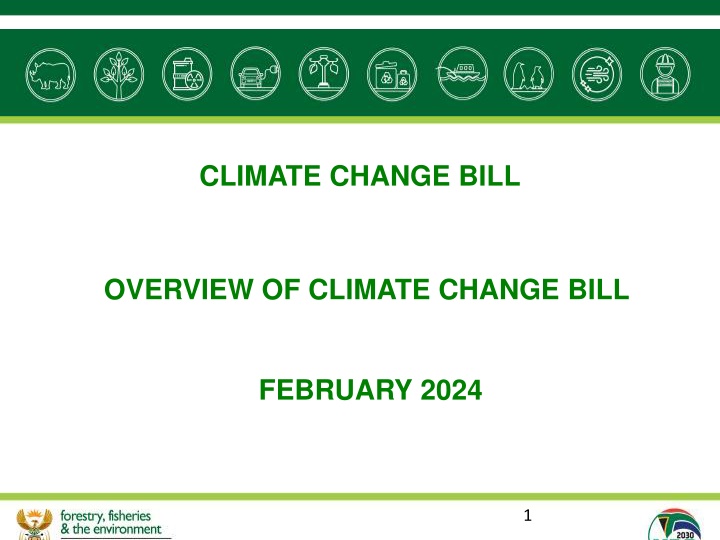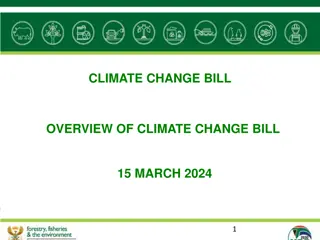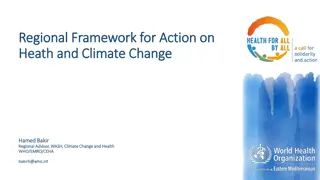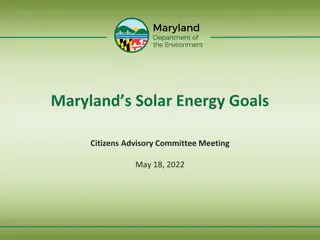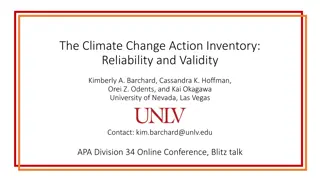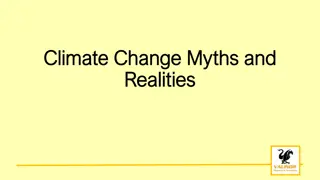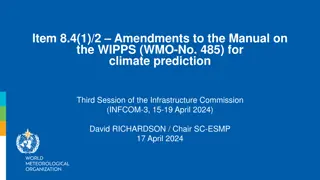Overview of Climate Change Bill February 2024
The Climate Change Bill of February 2024 aims to establish an effective national response to climate change, facilitating a transition to a low-carbon, climate-resilient economy for South Africa. It emphasizes coordinated action, adaptive capacity enhancement, greenhouse gas stabilization, and equitable transitions. The bill outlines key principles, objectives, and institutional arrangements to drive sustainable development in the face of global climate challenges.
Download Presentation

Please find below an Image/Link to download the presentation.
The content on the website is provided AS IS for your information and personal use only. It may not be sold, licensed, or shared on other websites without obtaining consent from the author.If you encounter any issues during the download, it is possible that the publisher has removed the file from their server.
You are allowed to download the files provided on this website for personal or commercial use, subject to the condition that they are used lawfully. All files are the property of their respective owners.
The content on the website is provided AS IS for your information and personal use only. It may not be sold, licensed, or shared on other websites without obtaining consent from the author.
E N D
Presentation Transcript
CLIMATE CHANGE BILL OVERVIEW OF CLIMATE CHANGE BILL FEBRUARY 2024 1
TABLE OF CONTENTS Purpose and objects of the Bill Principles of the Bill Key definitions Processing of the Bill by the Portfolio Committee (PC) Salient amendments effected by the PC Policy alignment and institutional arrangements Climate Change Response (provinces and municipalities) National adaptation to impacts of climate change Sector adaptation to impacts of climate change Greenhouse gas emissions and removals 2
PURPOSE OF THE BILL The purpose of the Bill is to enable the development of an effective national climate change response, and a long term just transition to a low-carbon and climate-resilient economy and society for South Africa in the context of sustainable development. 3
OBJECTS OF THE BILL The objects of the Bill are, amongst others, to provide for a coordinated and integrated response by the economy and society to climate change and its impacts in accordance with the principles of co-operative governance. provide for the effective management of inevitable climate change impacts by enhancing adaptive capacity, strengthening resilience and reducing vulnerability to climate change, with a view to building social, economic, and environmental resilience and an adequate national adaptation response in the context of the global climate change response. make a fair contribution to the global effort to stabilise greenhouse gas (GHG) concentrations in the atmosphere at a level that avoids dangerous anthropogenic interference with the climate system; and ensure a just transition towards a low carbon economy and society considering national circumstances. 4
PRINCIPLES To be integrated into the making of decisions which may have a significant effect on the Republic s ability to mitigate or which exacerbate its vulnerability to climate change; The national environmental management principles set out in section 2 of the National Environmental Management Act where applicable in this Act; Climate system should be protected for the benefit of present and future generations of humankind; Acknowledges international equity and each country s common but differentiated responsibilities and respective capabilities, in light of different national circumstances; A contribution to a just transition towards low carbon, climate resilient and ecologically sustainable economies and societies which contribute to the creation of decent work for all, social inclusion, and the eradication of poverty; and The need for integrated management, in the context of climate change, which requires climate change considerations. 5
KEY DEFINITIONS Below is a summary of key definitions; "climate change" means a change of climate that is attributed directly or indirectly to human activity that alters the composition of the global atmosphere and that is in addition to natural climate variability observed over comparable time periods. "direct greenhouse gas emissions" means greenhouse gas emissions from sources that are owned or controlled by a person. "indirect greenhouse gas emissions" means emissions that are a consequence of the activities of a person, but occur at sources owned or controlled by another person. "just transition" means a shift towards a low carbon, climate resilient economy and society and ecologically sustainable economies and societies which contribute toward the creation of decent work for all, social inclusion and the eradication of poverty. "mitigation" means a human intervention to reduce the sources or enhance the carbon sinks of greenhouse gases. "Nationally Determined Contribution" means the Nationally Determined Contribution, as amended from time to time, prepared in terms of Article 4(2) of the Paris Agreement and submitted by the Republic to the Secretariat of the United Nations Framework Convention on Climate Change in terms of Article 4(12) of the Paris Agreement. 6
PROCESSING BY THE PC The Portfolio Committee conducted physical and virtual public hearings on the Climate Change Bill from September 2022 to July 2023. Number of submissions received by the Portfolio Committee: - 101 Substantive written submissions; and - 1001 composite emails from Dear South Africa . Between August to October 2023, the Portfolio Committee deliberated on the comments received, and agreed of amendments to the Bill. The amended Bill was adopted and referred to the Select Committee on Land Reform, Environment, Mineral Resources and Energy for consideration. 7
SALIENT AMENDMENTS BY THE PC Clause of the Bill Amendment Clause 1 (Definitions) Inserted the definition of the terms national greenhouse gas emissions profile , Public Finance Management Act , and resilience . Clause 3 (Principles) Substituted the wording "the physically challenged" for the wording "persons with disabilities in clause 3(f). Clause 7 (Alignment of Policies) Inserted the words laws in clause 7(1) and traditional leaders and other stakeholders in clause 7(2). Clause Climate Commission) 10 (Presidential Provided for continued existence of the Presidential Climate Commission (the PCC); Listing of the PCC in terms of the Public Finance Management Act (PFMA) after promulgation of the Act. Appointment of 25 PCC Commissioners by the President; Chairing of the PCC by the President and appointment of the Deputy Chairperson; Prescribed the term of office of the Commissioners; Barred members of Parliament and Provincial legislatures from appointment as Commissioners; and Enabled the PCC to make its own rules, procedures & Code of Conduct. 8
SALIENT AMENDMENTS BY THE PC cont Clause of the Bill Amendment Clause 11 (Functions of PCC) Inserted clause 11(c) which provides that the PCC must advise government on any socio-economic matter related to the just transition and enabled the PCC to create committees in clause 11(3). Clause process) 12 (Appointment Provides for the process of appointment of Commissioners through a call for nominations; and Provides for the role and remuneration of the Commissioners. Clause 12A (Appointment of Executive Director) Inserted this clause to provide for the appointment of the Executive Director who will serve as the accounting officer of the PCC. Clause Administration of PCC) 12B (Financial Inserted this clause to provide for the financial administration of the PCC. Clause 13 (Reporting) The PCC must submit its reports, studies, strategies and recommendations to the National Assembly within 30 days. Reports of the PCC to be made publicly available. Clause 14 (PCC Secretariat) Provides for the appointment of the PCC secretariat by the Executive Director. Clause 15 (Climate Change Response) Provides for publication of the climate change needs and response assessments and implementation plans in the gazette, qualification of the timeframes with the wording atleast and other grammatical corrections. 9
SALIENT AMENDMENTS BY THE PC cont Clause of the Bill Amendment Clause mechanism) 15A (Finance Inserted to empower the Minister to prescribe a mechanism to support and finance the Republic s climate change response, planning and implementation by national, provincial and local government in consultation with the Minister of Finance. Clause Trajectory) 21 (Emissions Provides for the use of the latest updated Nationally Determined Contribution serves as the trajectory. Schedule 1 which was linked to clause 21 now deleted. Clause 27 (Regulations) Inserted provision for for development of regulations relating to the PCC and tabling of the regulations relating to the funding mechanisms in Parliament. Clause Penalties) 32 (Offences & Amended to provide for enhanced offences and penalties. . Schedule 2 (Reporting) Amended by the insertion of the following departments or functions: "Education", "Cooperative Governance" and "Traditional Affairs", "Technology" and "Tourism". Arrangement of sections The arrangement of sections part is also amended to reflect the new added clauses of the Bill. 10
POLICY ALIGNMENT AND INSTITUTIONAL ARRANGEMENTS Every Premier s intergovernmental forum, established in terms of section 16 of the Intergovernmental Relations Framework Act, also serves as a Provincial Forum on Climate Change. A Provincial Forum on Climate Change may establish an intergovernmental technical support structure in terms of section 30 of the Intergovernmental Relations Framework Act if there is a need for formal technical support to the Provincial Forum on Climate Change. Every district intergovernmental forum, established in terms of section 24 of the Intergovernmental Relations Framework Act, also serves as a Municipal Forum on Climate Change A Municipal Forum on Climate Change may establish an intergovernmental technical support structure in terms of section 30 of the Intergovernmental Relations Framework Act if there is a need for formal technical support to the Municipal Forum on Climate Change. 11
POLICY ALIGNMENT AND INSTITUTIONAL ARRANGEMENTS The Presidential Climate Commission which existed immediately before the commencement of this Act continues to exist. The Presidential Climate Commission will, upon being listed as a public entity in Schedule 3 to the Public Finance Management Act, be a national public entity for purposes of the Public Finance Management Act and will be subject to the provisions of the said Act. The Presidential Climate Commission is independent, impartial and will have the full legal capacity of a juristic person once it is listed as a national public entity in Schedule 3 to the Public Finance Management Act. The President must appoint not more than 25 members who will serve as commissioners of the Presidential Climate Commission, comprising representatives of, including but not limited to, a fair representation of government, organised labour, civil society, traditional leaders, the South African Local Government Association and business, to advise on the Republic s climate change response, the mitigation of climate change impacts and adaptation to the effects of climate change towards the attainment of the just transition to a low-carbon and climate-resilient economy and society. 12
POLICY ALIGNMENT AND INSTITUTIONAL ARRANGEMENTS The functions of the Presidential Climate Commission Advise on the Republic s climate change response to ensure realisation of the vision for effective climate change response and the long-term just transition to a low-carbon and climate-resilient-economy and society. Advise government on the mitigation of climate change impacts, including through the reduction of emissions of greenhouse gases, and adapting to the effects of climate change; and Advise government on any socio-economic matter related to the just transition. The role of a commissioner is to provide advice to the Presidential Climate Commission on the Republic s climate change response, the mitigation of climate change impacts and adaptation to the effects of climate change towards the attainment of the just transition to a low-carbon and climate- resilient economy and society. 13
CLIMATE CHANGE RESPONSE: PROVINCES AND MUNICIPALITIES At least within one year of the publication of the National Adaptation Strategy and Plan contemplated in section 18, undertake a climate change needs and response assessment for the province, metropolitan or district municipality, as the case may be; At least within two years of undertaking the climate change needs and response assessment contemplated in paragraph (a), develop, implement and publish in the Gazette a climate change response implementation plan as a component of, and in conjunction with, provincial, metropolitan or district municipal planning instruments, policies and programmes; A metropolitan or district municipal climate change response implementation plan, contemplated in subsection (1)(d), must form a component of the relevant municipality s integrated development plan adopted in terms of section 25 of the Local Government: Municipal Systems Act, 2000 (Act No. 32 of 2000). The Minister must prescribe a mechanism to support and finance the Republic s climate change response, planning and implementation by national, provincial and local government in consultation with the Minister of Finance. 14
NATIONAL ADAPTATION TO IMPACTS OF CLIMATE CHANGE The Minister must, within one year of the coming into operation of this Act, determine by notice in the Gazette (a) national adaptation objectives which will guide the Republic s adaptation to climate change impacts, the development of resilience and sustainable development; (b) indicators for measuring progress towards achieving the national adaptation objectives; The Minister must, within one year of the coming into operation of this Act, develop adaptation scenarios which anticipate the likely impacts of climate change in the Republic and associated vulnerabilities over the short, medium and longer term; Climate change adaptation within the Republic must be managed in a coherent and coordinated manner and in accordance with a National Adaptation Strategy and Plan. The Minister must, in consultation with the Ministers responsible for the functions 35 listed in Schedule 2, develop and publish a National Adaptation Strategy and Plan by notice in the Gazette within two years of the coming into operation of this Act. 15
SECTOR ADAPTATION TO IMPACTS OF CLIMATE CHANGE At least within two years of the publication of the National Adaptation Strategy and Plan, develop and implement a Sector Adaptation Strategy and Plan which must be informed by the assessment undertaken in terms of paragraph (a)(i) and serve to implement the measures and mechanisms determined in terms of paragraph. At least every five years, review a Sector Adaptation Strategy and Plan and, if required, amend the Sector Adaptation Strategy and Plan; A Minister responsible for functions listed in Schedule 2, must at least within five years of the publication of a Sector Adaptation Strategy and Plan, and at five-yearly intervals thereafter, submit reports to the Minister on the progress made in relation to the implementation of the relevant Sector Adaptation Strategy and Plan. The Minister must collate, compile and synthesise information relevant to the achievement of the national adaptation objectives and the objectives of this Act and thereafter publish a Synthesis Adaptation Report for consideration by Cabinet and to be used in the Republic s national and international reporting processes. 16
GREENHOUSE GAS EMISSIONS AND REMOVALS The Minister must, in consultation with Cabinet, by notice in the Gazette determine a national greenhouse gas emissions trajectory for the Republic. Until such time as the Minister publishes the national greenhouse gas emissions trajectory in terms of subsection, the latest updated Nationally Determined Contribution serves as the trajectory. The Minister must, within one year of the coming into operation of this Act, by notice in the Gazette, list the greenhouse gas emitting sectors and subsectors that are subject to sectoral emissions targets. The Minister must, in consultation with the Ministers responsible for each sector and subsector listed in terms of subsections and determine by notice in the Gazette the prescribed framework and the sectoral emissions targets for sectors and subsectors. The Minister responsible for each sector or subsector for which sectoral emissions targets have been determined, in accordance with subsection, must adopt policies and measures towards the achievement of the sectoral emissions targets. 17
GREENHOUSE GAS EMISSIONS AND REMOVALS The Minister responsible for each sector and subsector for which sectoral emissions targets have been determined in terms of subsection or for which revised and amended sectoral emissions targets have been determined in terms of subsection must annually report to The Presidency on progress towards the achievement of the relevant sectoral emissions targets. The Minister must collate, compile and synthesise the reports provided in terms of subsection and submit progress reports on the implementation of the sectoral emissions targets to Cabinet on an annual basis. Listed greenhouse gases and activities The Minister must, by notice in the Gazette, publish a list of greenhouse gases which the Minister reasonably believes cause or are likely to cause or exacerbate climate change. The Minister must, by notice in the Gazette, publish a list of activities which emit, or has the potential to emit, one or more of the greenhouse gases listed in terms of subsection. 18
GREENHOUSE GAS EMISSIONS AND REMOVALS Carbon budgets The Minister must allocate a carbon budget to any person that conducts an activity listed. A person to whom a carbon budget has been allocated in terms of subsection must prepare and submit to the Minister, for approval, a greenhouse gas mitigation plan. At the time when the carbon budget is assigned for the first mandatory carbon budget cycle, all approved pollution prevention plans as contemplated in section 29 of the National Environmental Management: Air Quality Act, 2004 (Act No. 39 of 2004), and the National Pollution Prevention Plans Regulations, 2017, published under Government Notice No. 712 of 21 July 2017, must be deemed to be greenhouse gas mitigation plan. The Minister must review a carbon budget allocated to a person in terms of subsection at the end of the five-year carbon budget commitment period, or upon request by a person subject to a carbon budget. 19
GREENHOUSE GAS EMISSIONS AND REMOVALS Phase-down and phase-out of synthetic greenhouse gas emissions and declaration The Minister, in consultation with the Ministers responsible for the greenhouse gas emitting sectors and subsectors contemplated in section 22, must by notice in the Gazette. The Minister, in consultation with the Ministers responsible for the greenhouse gas emitting sectors and subsectors contemplated in section 22, and any affected party, in the prescribed manner. The Minister may allocate a carbon budget to persons undertaking activities that give rise to emissions of the synthetic greenhouse gases declared pursuant to subsection (1), in which event the Minister must follow the process for the allocation of carbon budgets provided for in section 24. National Greenhouse Gas Inventory The Minister must establish an institutional arrangement to facilitate a national system of data collection for the creation of a National Greenhouse Gas Inventory and the annual compilation of the National Greenhouse Gas Inventory Report. 20
THANK YOU! Department of Forestry, Fisheries and the Environment Tel: 012 399 9188 | Mobile: 0664896741 Website: http://www.environment.gov.za Address: The Environment House, 473 Steve Biko Road, Arcadia, Pretoria, 0083 21
